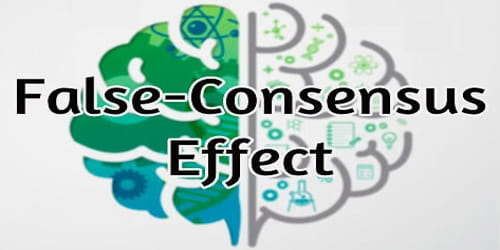False Consensus Effect
The false consensus effect occurs when we overestimate the number of other people (or the extent to which other people) shares our opinions, beliefs, and behaviors. This effect is likely to occur most often when considering opinions, beliefs, and behaviors that are important to us. This effect can be contrasted with pluralistic ignorance, an error in which people privately disapprove but publicly support what seems to be the majority view.
There may be a number of good examples of the false consensus effect. Below are two false consensus examples:
- After seeing a film a person believes that the film is excellent. The person overestimates the percentage of people who thought that the film was excellent.
- A person believes that a cat is a better pet than a dog. The person overestimates the percentage of people who agree with this view.
The false-consensus effect can be contrasted with pluralistic ignorance, an error in which people privately disapprove but publicly support what seems to be the majority view (regarding a norm or belief) when the majority, in fact, shares their (private) disapproval. While the false-consensus effect leads people to wrongly believe that the majority agrees with them (when the majority, in fact, openly disagrees with them), the pluralistic ignorance effect leads people to wrongly believe that they disagree with the majority (when the majority, in fact, covertly agrees with them).
The false consensus effect was first described by social psychologists in 1977. In one of the first research projects demonstrating the effect, researchers approached college students as they walked across campus and asked the students to advertise a restaurant by wearing a large sign that said, “Eat at Joe’s.”
One of the possible causes of the false consensus effect involves what is known as the availability heuristic. When we are trying to estimate how common or likely something is we tend to look at the examples that come to mind most readily.
Researchers have suggested that there are three main reasons why false consensus occurs:
- Our family and friends are more likely to be similar to us and share many of the same beliefs and behaviors.
- Believing that other people think and act the same way we do can be beneficial to our self-esteem. In order to feel good about ourselves, we are motivated to think that other people are just like us.
- We are the most familiar with our own attitudes and beliefs. Since these ideas are always at the forefront of our minds, we are more likely to notice when other people share similar attitudes.
It is also possible that our believing that other people are similar to us can serve to boost our self-esteem. So assuming that others share our opinions, beliefs, and behaviors help us feel good about ourselves and our opinions, beliefs, and behaviors.
This effect demonstrates a type of bias to which individuals fall prey in their typical thinking, thus often referred to as a type of cognitive bias.
The concept of false consensus effect can also be extended to predictions about future others. Belief in a favorable future is the belief that future others will change their preferences and beliefs in alignment with one’s own. Belief in a favorable future suggests that people overestimate the extent to which other people will come to agree with their preferences and beliefs over time.
Information Source:
















